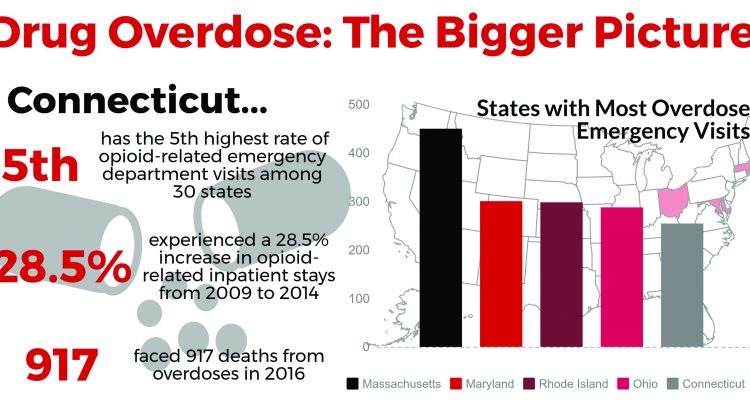To bring attention to the problem of drug overdoses and the risks inherent with today’s party culture, Counseling & Psychological Services, the Collegiate Recovery Program, Fairfield University Student Association, Campus Ministry, the Student Health Center and the Dean of Students all worked together to organize a day devoted to highlighting this drug-related issue. The event is scheduled for Nov. 7, and plans to highlight the overdose dilemma by raising 917 purple flags to remember that exact number of individuals who overdosed in the state of Connecticut over the course of 2016.
Additionally, there is also a plan to give a public safety demonstration on the use and importance of Narcan, which is a drug that has the ability to counteract and reverse the effects of opioid overdose, as per Narcan’s website. Assistant Vice President and Director of Counseling & Psychological Services Susan Birge expressed that “Narcan is an opiate antidote. When a person is overdosing on an opioid, breathing can slow down or stop, and it can very hard to wake them from this state. Narcan blocks the effects of opioids and reverses an overdose. Narcan saves lives.”
In regards to the distribution of Narcan on campus, Birge added that “all of the Public Safety Offices and the Student Health Center medical staff have been trained to administer Narcan. Additionally, on Overdose Awareness Day, some individuals who know students well such as Rev. Michael Doody, S.J., will be trained and provided with Narcan.”
One student, Patrick Setiadi ‘20 expressed, “I know that overdoses have become such a large issue in the U.S. over the years, so having a day dedicated to awareness on the topic is really great.”
Another student, Mariana Brandao ‘20, noted, “I think that having overdose awareness day is a good thing for Fairfield to have because it’s such a big issue in our country. I hope that the event will help to bring more attention to the problem.”
In addition to the distribution of Narcan and highlighting the prevalence of overdoses in Connecticut and around the country, the day will also feature a documentary screening of “If They Had Known,” which is a film about the fatal overdose of University of Denver student Clay Soper. “Clay went out to party and drank a few beers, took a couple of Xanax and went to a house party. At some point in the evening, his friends realized that Clay had had too much to drink. They decided to let him ‘sleep it off,’ and put him to bed,” according to Susan
Birge. She added that “during the course of the night, the combination of alcohol and anti-anxiety medication caused his respiratory system and his heart to slow and then to stop. He was pronounced dead at the hospital.”
In the film itself, Soper’s mother, Genny Soper, expressed that “he made a bad decision and he should not have died.”
This campus event, in itself, is immensely important according to Birge, because it ultimately seeks to continue the University’s 21-year record of not having a single student experience a fatal overdose. She noted that whilst this record is impressive, there is a much larger opioid epidemic taking place all over the United States, which is both a public safety and health crisis.
The rate of overdose fatalities in Connecticut for 2017, as per the state’s Medical Examiner, Dr. James Gill, is projected to be 1,078 deaths, which is an 18 percent increase in contrast to last year.
As per the Connecticut Department of Public Health website, a 2013 CDC report stated that the Connecticut age-adjusted rate for drug-related mortality is 16.4 per 100,000 population compared to the national rate of 14.6.
The Hartford Courant also noted that “For inpatient stays related to opioid use, the state ranked seventh highest among 44 states, at 337.5 stays per 100,000 — above the national rate of 224.6.” Additionally, the Hartford Courant also stated that in the state of Connecticut, the rate of opioid-related inpatients “increased 28.5 percent between 2009 and 2014, while its rate of emergency visits increased 35 percent. Nationally, those rates increased 23.8 percent for inpatients and 65.6 percent for emergency room visits.”
One of the main drugs involved in fatal overdoses, according to Birge, is Fentanyl, a strong synthetic drug. She states that “Fentanyl is a synthetic (man-made) opioid that is 50 times more potent than heroin and 100 times more potent than morphine. Carfentanil is 10,000 times more potent than morphine.”
To raise awareness for the epidemic as well, Campus Ministry will be hosting a candlelight vigil at the traffic circle at 6:30 p.m. There will also be two information booths that will be distributing facts about overdoses and how to prevent them or get help, one being from 1 to 3 p.m. in the Dolan School of Business and the other from 3 to 5 p.m. in the Leslie C. Quick, Jr. Recreation Complex.


Leave a Reply